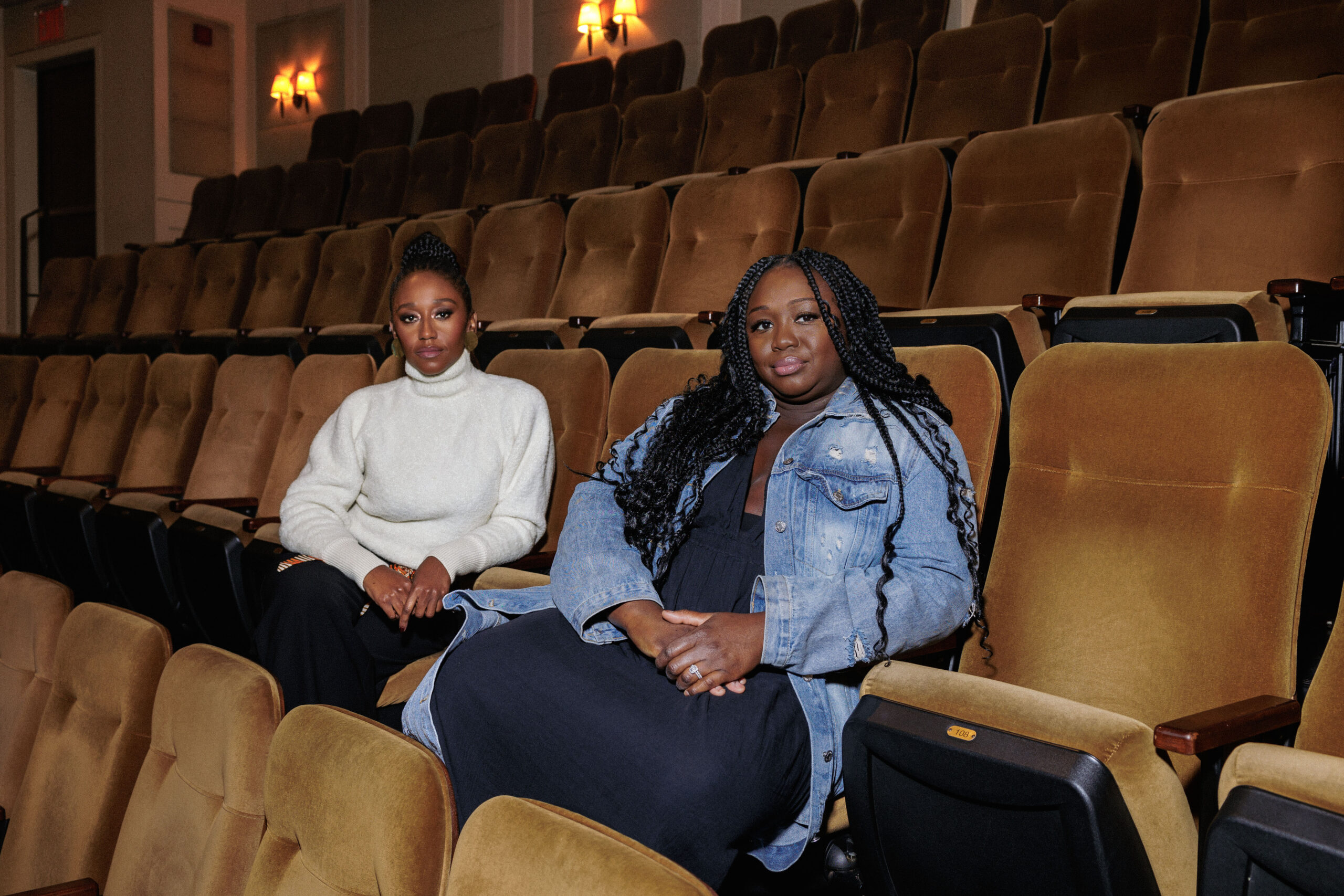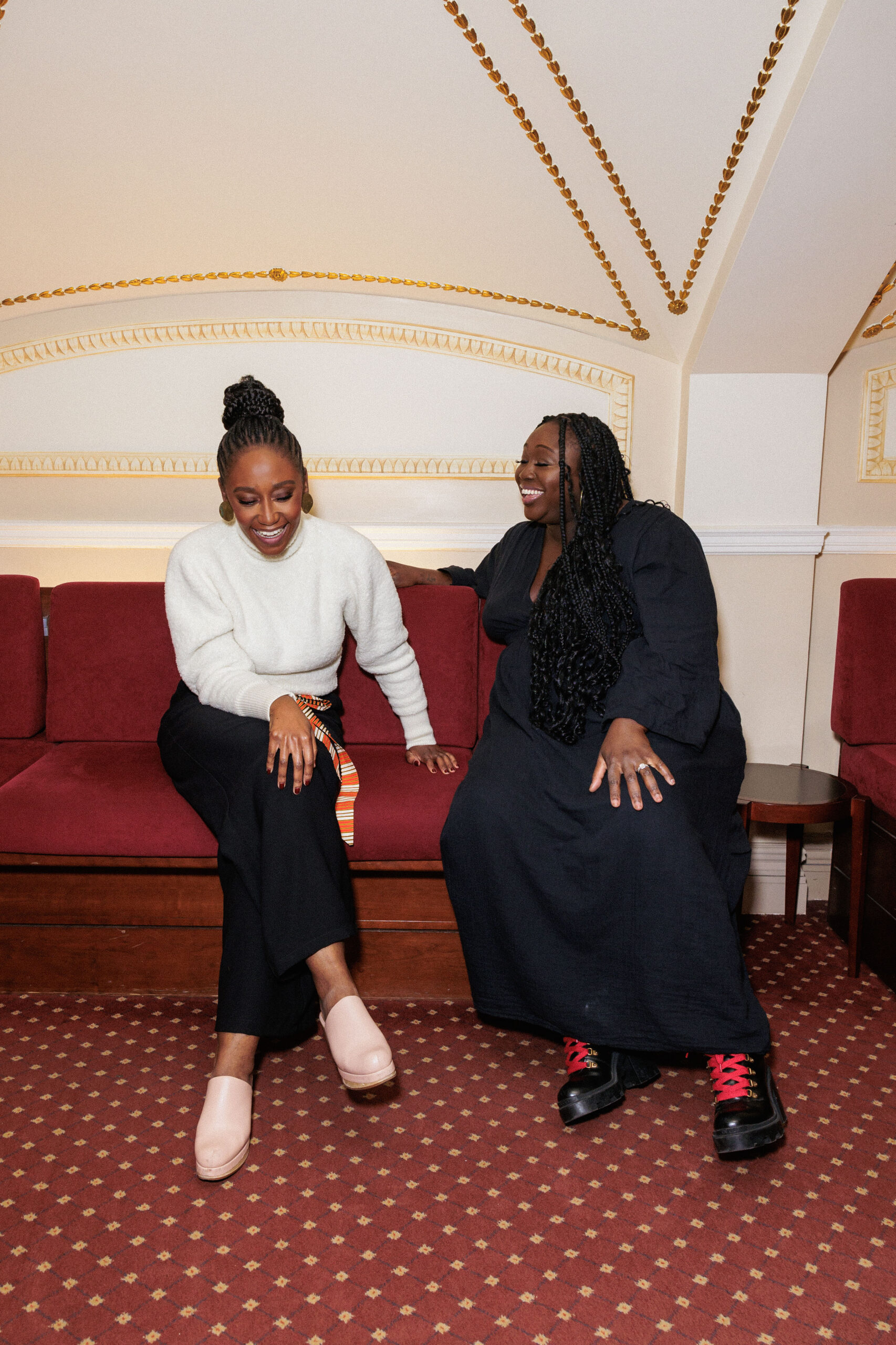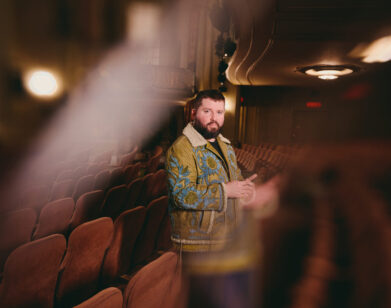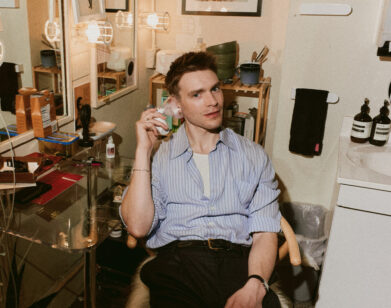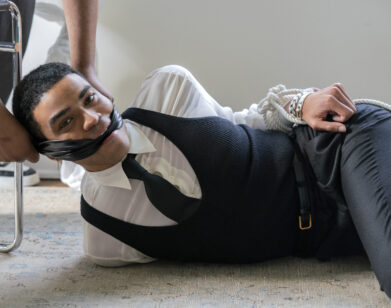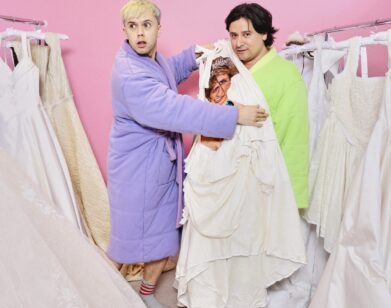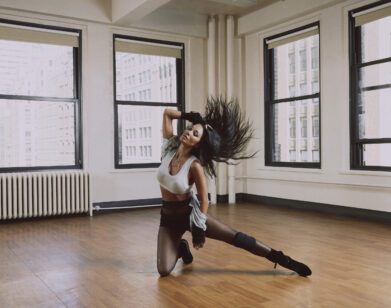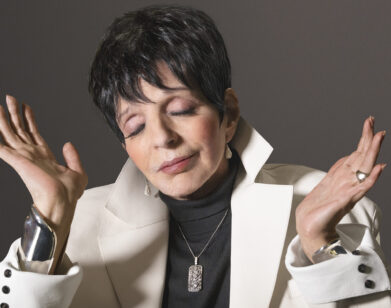SALON
How Jocelyn Bioh and Nana Mensah Brought Hair Braiding to Broadway
At the end of 2021, the actor Nana Mensah took part in a live reading of the play Jaja’s African Hair Braiding, which was still in its infancy. “At the end of that reading,” she recalls, “we got a standing ovation. I’d never seen people stand and clap at a reading with music stands.” Moments later, producers from the Manhattan Theater Club, most if not all of which had never stepped foot inside an African hair braiding salon, pulled the playwright, Jocelyn Bioh, aside, and told her they wanted to take the show straight to Broadway. Fast forward about two years and Jaja’s, a sly and affecting story of immigrant grit dressed up as a side-splitting workplace comedy, is in its last week on Broadway, during which performances will be live-streamed for out-of-towners. One person who did get a chance to see the show in person was the comedian and Insecure actor Yvonne Orji, who joined Bioh and Mensah earlier this week for what she called “a beautiful amalgamation of Africans on a Tuesday afternoon.” As Jaja’s comes to a close, the three discussed diaspora narratives, the fallacy of thinking of Black audiences as “niche,” and the “full-day extravaganza” that is a visit to the hair salon.
———
YVONNE ORJI: Well, hello ladies. This is a beautiful amalgamation of Africans on a Tuesday afternoon, because why not?
JOCELYN BIOH: Yes. Are you in L.A.?
ORJI: I am in L.A. I’m, yes. Your brick background is giving New York.
BIOH: I’m in New York, giving bookshelf with a little bit of Christmas decorations.
NANA MENSAH: This one is insane about Christmas decorations.
ORJI: You’re Mariah Carey and we haven’t even gotten to Thanksgiving.
MENSAH: That’s right.
BIOH: I don’t care. It’s giving “boo” on Halloween and “ho-ho-ho” the next day.
ORJI: You know what? I’m not knocking it. Anyway, I’m just going to just get right into it. So, when people hear about Dreamers, they immediately assume the Latinx community or an othering of sorts. But what the play does so brilliantly is shine a light on the other immigrant groups that are not talked about in that conversation. You shined a light on Africans. Obviously, as Africans, we know those stories, we know the history, we know the aunties who are so intelligent and they would’ve been engineers, doctors, lawyers. So I would love to just hear your take on why, why now, and the genesis of the play.
BIOH: Thank you for that because, when I started writing the play, it was top of 2019. We were edging towards a year that we didn’t expect and the end of an administration that seemed like it was never going to end. So a lot of the rhetoric that was being spewed during that administration was all about building a wall, shutting down borders, and making it seem like the immigrant experience only belonged to one group of people. And the reality is, that is not the case. And the whole time I was going to get my hair braided, as I always have, many of these women in the shop would have were alarmed by everything that was being said. And anytime a cop car rolled by, they were really scared. And I thought, “God, what has this world come to?” You have people actually running scared when they’re just trying to make a living and pursue what we all believe is the American dream. So I wanted to write a play about it and look, I’m a comedic writer, I hope, but—
ORJI: As a standup comic, it was funny, girl. It was funny. Don’t you worry.
BIOH: Okay, thank you. I knew that I could find a kind of “spoonful of sugar mentality” with the play, but also shine a light on all aspects of immigration. How expensive it is to get DACA, which is why our character in the show can’t just sign up and get it. The different ways in which people have attained their citizenship, whether they were born into it, got married, all those things are addressed. Those are all stories from my own life, my family’s life. And what a great way to put all that in one blender, set it in a hair braiding shop, which in and of itself is also a rich kind of melting pot of Africanness.
MENSAH: It’s a great equalizer. Black people of every stretch from every corner all end up there.
BIOH: 100%. And of different countries, too. That’s kind of why they’re all in the play. The shop I go to, most of them are from Senegal, so they all speak Wolof for the most part, or some version of French. I wanted to really mix it up and show how diverse the continent of Africa is. There’s still people who believe it to be a country, bless them.
ORJI: And some people who believe it to be a ish hole country, which we know is not correct. I think some of the comedic genius is how you use humor. It’s one thing to just write humor, but then it’s another thing to make humor the environment, tring humor into the fullness of the experience. And I think did so massively with the dance interlude, with the men we know that come into every braid gallery trying to sell you some stuff you don’t want.
MENSAH: I think there’s something really wonderful about being in a place where you have to be for many, many hours, and being in community with people, right? Because that doesn’t happen anymore, which is why I love plays set in the workplace, because you are all trapped there and you’ve just kind of got to get along. Whenever you have people who, for whatever reason, can’t leave and are forced to endure hours and hours and hours together, their real personalities start spurting up, I just think it’s so ripe for comedy, for drama, for everything. When she mentioned she was working on this, I was like, “What is that? I need to be a part of that.” It sells itself. Knowing how formidable she is as a writer, and taking that setting, I was like, “you’re the only person who can do this, and you’re going to do it masterfully.” Building the community for us as braiders was really amazing. Whitney White, our director, was so intentional about putting us through braiding bootcamp.
ORJI: You were actually braiding-
MENSAH: Yes, yes, yes. And all of us actors were coming to braiding with different levels of skill. I was on the lower end.
BIOH: The first week of rehearsal, we were just trading war stories of our hair braiding shop experiences, good and bad. And everybody had one or the other.
ORJI: It feels like such a fight when you go in there. It is like, “What do you want?” And it’s like—
BIOH: It’s my hair. I’m paying you.
ORJI: Or it’s too tight. “Are you sensitive?” I’m like, “What if I am. You know what? Can you be less tough?” You’re getting my money.
BIOH: That part.
ORJI: I love the timed lapse. It’s not Nigeria or Ghana where there can be 18 people on the head at the same time and micro braids can be done in five minutes. This is a full-day extravaganza.
BIOH: That’s the way it goes in my shop.
ORJI: So, theater and Broadway specifically has been the gatekeeper for some time about what kind of shows theatergoers “want” to see. It’s called the Great White Way. Jaja has a very, very lively audience that makes for almost a black church experience, if you will, in the call and response. We were dancing. Nana, what is it like working under those conditions? Good or bad?
MENSAH: It’s a fine line. On one hand, it feels so good when you know. And honestly, you can tell early on in the show, when she comes in and asks for micro braids. If the audience goes ham, I’m like, “Oh, okay. We’re performing for our people tonight.” There are certain jokes where I’m like, “Okay, I know what kind of show we’re going to have.” There are times where it is glorious. There are times where it crosses the line. Without spoiling anything, it does take a bit of a turn. And when it takes a turn and people are still kind of giving that participatory energy, it’s like, “no, no, no.” Now, you are outside of the thing. But I love that the audience feels in on the joke.
ORJI: Yeah, we knew your man was trash.
MENSAH: I was about to get to that. That scene between Aminata and James is one of the places where it really hits an inflection point. People are so angry. They are so mad at me. And sometimes we have to hold.
ORJI: You can tell who’s doing their trauma work.
BIOH: Exactly. To me, the people who are yelling and hollering are the ones who actually have given the man the money and are feeling some type of way and don’t want you to make the same mistake.
MENSAH: It comes from a place of love.
ORJI: Jocelyn, did you write with the idea that the audience would be a character in this way? Or were you just like, “I know my people, I think my people are going to be here, and so I’m writing what I know about them”?
BIOH: I would say the latter. I am the writer who annoys the marketing team, the press team, the publicist. I’m shooting for the stars and pushing, pushing, pushing for everything to be right. So I always knew my people were going to come. I always knew the people who connect to this play were going to come see the play. And that’s part of the conceit of it and why people feel so involved. Because with the design of the set, you feel like you’re in the shop. You’ve come in, you’ve asked for micros, and now you’re here all day.
MENSAH: Buckle up.
BIOH: I always want my work to feel like it’s inviting people in, not shining a light and turning it off and telling you to go away. I want people to feel like they’ve been involved and like they’re friends with these people, so that way when they’re walking out of the theater, they’re thinking about their own implicit biases about immigration, about the African lady they passed on the street when they were moving into their overpriced, gentrified apartment in Harlem. How are you now going to interact with this African woman you see on the corner who might be soliciting you to get braids? You will think about her differently after you’ve seen this play. And I think that that’s a big win.
MENSAH: I want to circle back to what you said about marketing because we know that there have been incredible shows on Broadway that had to end runs prematurely because they couldn’t find their audience. Or rather, Broadway didn’t know how to bring them their audience. I want to know how Jaja has been successful in that regard? Just let this be a masterclass for future productions. Can you speak to how you were able to stick to your vision of who you wanted there, and also make sure the traditional Broadway audience came?
BIOH: Yeah, thank you for saying that. A lot of shows by black and POC artists in the last few years, especially post-COVID, have been in and out in a minute. Or you only heard about the show when it was about to close and there was a massive campaign to try to keep it open. I feel like we have to educate theater audiences on two things. One is, don’t wait until opening night after reviews come out to wait for people to come. We have to start from day one. And two, the reason why we have to start from day one is because most times, ticket prices before the show opens are cheaper than they are after the show opens. If you get to an audience with discount codes, promo codes, tell them, “You need to come starting today, first preview,” they’re essentially part of the rehearsal of how we’re figuring the show out but they’re still excited to experience the show before anybody else does. And a third part is the marketing. Sometimes people don’t realize that images are seared into your brain for a reason. You see it and you’re like, “What is that? I need to know what that is.” Or you see it and you’re like, “I know that that thing is speaking to me.” And that Black girl getting her hair braided with that pile of braids, looking up at her hair braider, presumably optimistically, like, “Are you done?” That is an image that spoke so iconically. And we got a Black artist to come on and do that. We enlisted a Black artist who’s already ensconced in Black art and there was already such a shorthand there. That scene, Yvonne, of you and Issa, when she is in your lap. I got that framed and gave it to one of my best friends as a gift once because that image is so iconic to me of sisterhood, friendship. It really speaks to what that show is about, what that show meant to so many of us. You have to think about what is going to speak to an audience. Between the art, the word of mouth, encouraging affordable tickets. Thanks to that, once everyone’s heard about it, they may want to pay extra anyway.
ORJI: It’s knowing your audience. It’s the multicultural marketing. It’s the specificity. And I love it because it shows. Some would say that you are catering to a quote-unquote niche audience, but we know that there’s nothing niche about the African continent or its people.
BIOH: All three of us can speak to this, but we have a very unique perspective being first generation. We come from parents who came to America with their American dream, but we grew up as Black women in America. We have a very unique perspective. There’s been so much conversation in recent years, the diaspora wars and everything like that, that’s been unlocked. We’re all descendants of each other. We’re all connected. Not to get super spiritual, but it’s true. We are really all connected. There was a massive campaign for many, many years. It was like, “Don’t go to Africa. There’s nothing there except war and AIDS.” And then in another way it was like, “Don’t go to America.” Those two narratives can’t exist peacefully. It can’t be that Africa is a place you avoid, it’s barren, but you’re also pillaging it for all of its minerals, all of its diamonds, all of its gold and oil. And it also can’t be that America’s this beautiful, incredible, amazing place that participated in the recreational terrorism of Black people for 400 years. So we have to now understand the whole truth of it all and bring the culture together. I think this play really does that very specifically, because any and all kinds of Black people are in it. It feels very exciting and thrilling.
ORJI: Do you feel like these plays that you create help bridge the gap and the divide between Africans and African-Americans across the diaspora? And secondly, do you feel like you have a responsibility to do that?
BIOH: I do feel a responsibility. I feel like it’s an incredible privilege to be somebody who is talking about the newness of Africa. I think people have an old idea and narrative of what the continent is. And I’m speaking to the new narratives, the people who are coming with a new ideology and a new way of life. The first time I went back to Ghana as an adult to experience it was in 2018. I actually stayed with Nana and we were out at the club. We were going everywhere. We were living lives. We’re mothers now and it’s so different.
ORJI: You a mother?
BIOH: I’m a whole mother, okay? It was so invigorating to be there. I never imagined being at a marketplace buying my shea butters and whatever. There was somebody from Louisiana right next to me asking me, “Oh, what are you going to get? It’s a beautiful and amazing thing.
ORJI: I want you ladies to know you’re ushering in not only new stories, but new hope and new belief for creatives, for audience members. The world is so backwards right now. We needed those minutes of laughter. We needed those minutes of reprieve, even though there was some pain and drama that came with it, but at least we were experiencing it together and then we could collectively exhale. But was there anything in the show that the producers didn’t understand that you guys had to fight for?
BIOH: Oh, I mean everything. And not necessarily fight. The Manhattan Theater Club, the theater that’s responsible for producing it along with our producers—LaChanze, Taraji [P. Henson], and Madison Wells Live—they loved the play. But LaChanze and Taraji were probably the only people who’d ever actually been in a hair braiding salon. So there was a lot of education on what a shop looks like, what it feels like, who frequents it, what the vibe is. But I was willing to hold their hand through it, because, look, a part of holding people accountable is patience, and educating them on how to successfully produce it.
MENSAH: We did a reading of this play at the end of 2021 and it was a stage reading, with music stands, whatever. At the end of that reading, we got a standing ovation. And this has never happened to me before. I’ve never seen people stand and clap at a reading with music stands. And so it was so clear to everyone, including Lynne Meadow, the head of Manhattan Theater Club, who’s seen a lot of plays. She’s been running this company for 50 years. And then right after that she was like, “I’m committing.”
BIOH: 15 minutes later she pulled me into her office and was like, “We want to do it on Broadway.” And I was like, “What?”
MENSAH: She was like, “I know what I’m seeing. I know how this can affect people. It’s affected me. S no out of town tryout, we’re going straight to Broadway with this.” So even though Lynne Meadow and the top brass at MTC have never been inside an African hair braiding salon, that does not mean that they can’t help you exact your vision. And I think that that’s really great that you met them with patients and a bit of handholding to get there.
ORJI: Well, I’ll throw my name in the hat if you need to produce it for the next thing, girl. We got some Hollywood dollars up in here. I act as well. I do accents. You said that you have my picture, you gave it to a friend. So I’ll bring you jollof rice with vegetables, if that’s what you want.
MENSAH: Wow. Wow.
BIOH: You know what? I’ll take it. I’m not going to turn away rice. Okay. Controversial opinion. They’re both good.
ORJI: People say I have trust issues. I add stew to my jollof. Yeah, I do.. Because I like saucy things. I’m a saucy chick.
MENSAH: I love saucy things. A cousin of mine was like, “I don’t like wet food.” And I was like, “Yo, we can’t talk.” Sauce is life. Sauce is everything.

